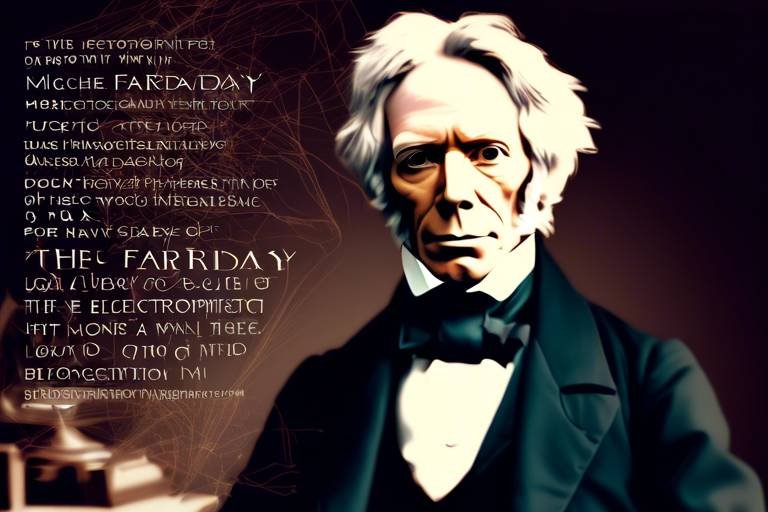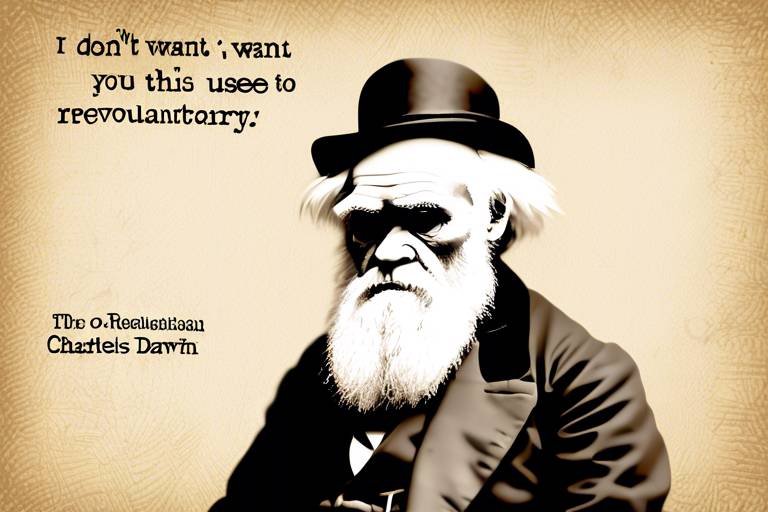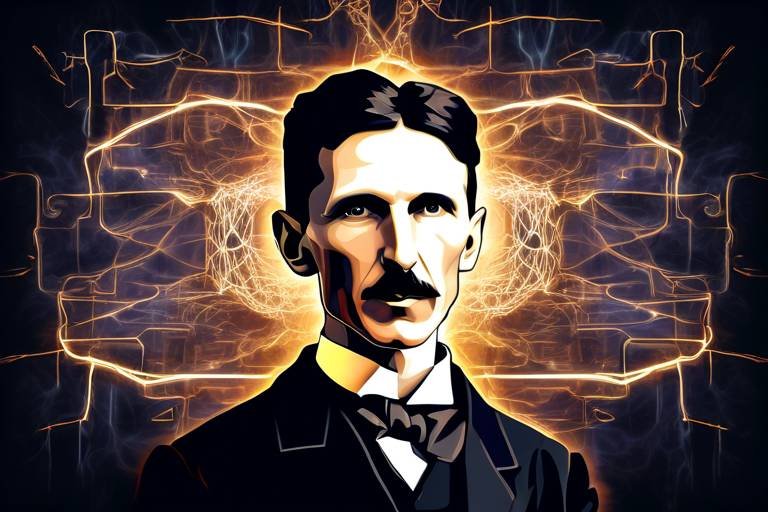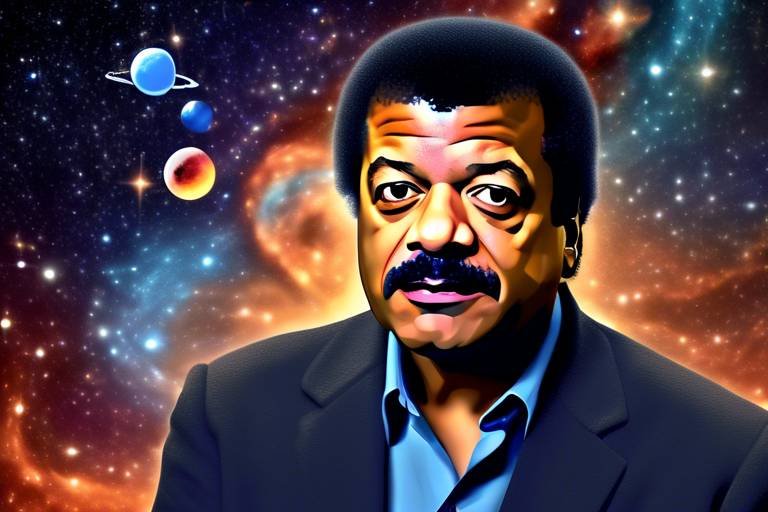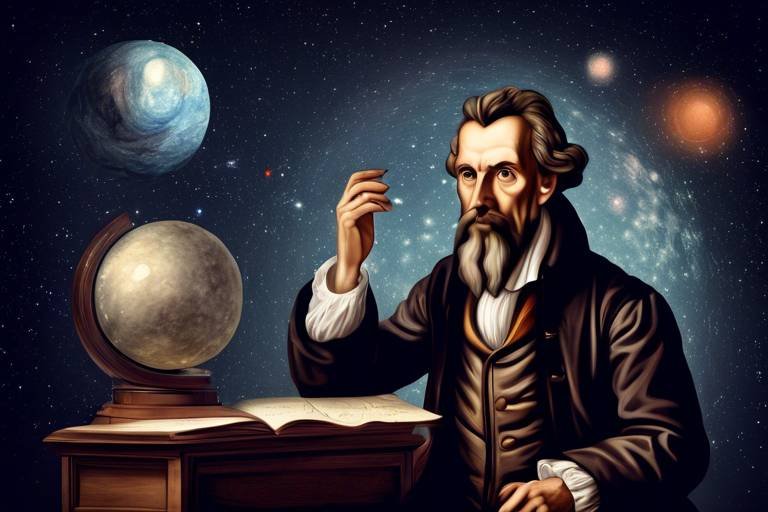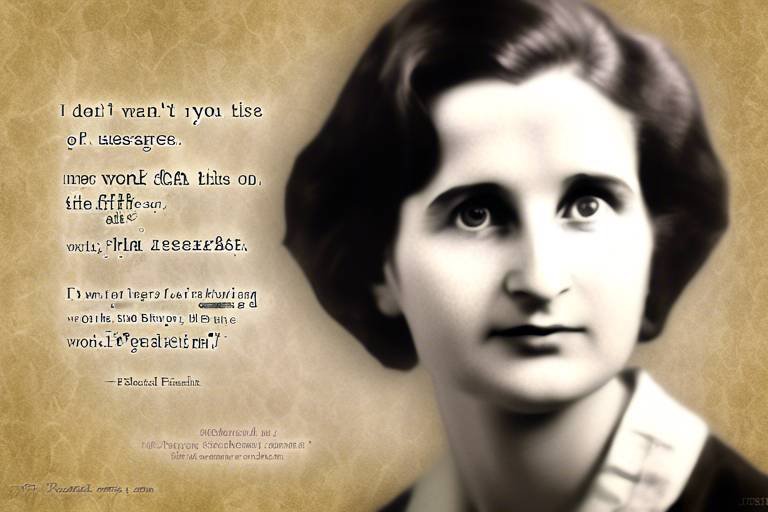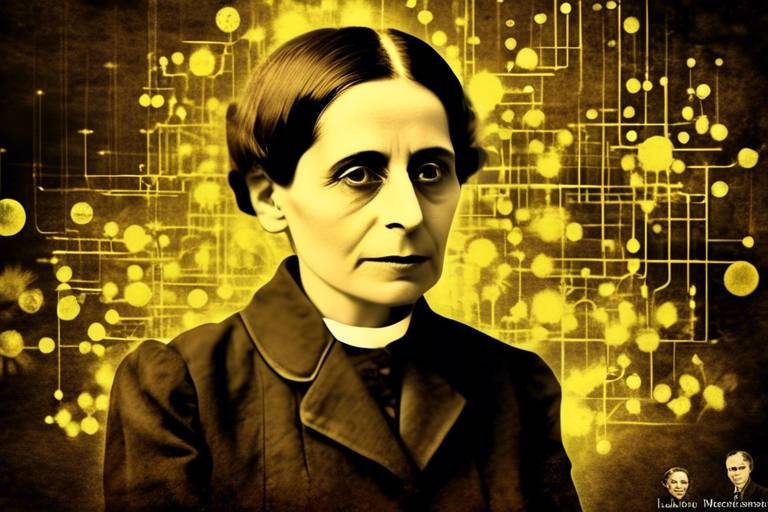Michael Faraday - The Father of Electromagnetism
Michael Faraday is not just a name in the annals of science; he is a beacon of inspiration and a testament to the power of curiosity and determination. Born in a modest family in 1791, Faraday's journey from a humble apprentice to one of the most influential scientists of all time is nothing short of extraordinary. His relentless pursuit of knowledge and his groundbreaking work in the field of electromagnetism have laid the foundation for much of modern technology that we often take for granted today.
Imagine a world without electricity, where the hum of machines and the glow of lights are mere figments of imagination. Faraday's discoveries opened the floodgates to the electrical revolution, making him a pivotal figure in shaping the technological landscape of our society. His work not only illuminated the mysteries of electricity and magnetism but also paved the way for innovations that have transformed our daily lives.
In this article, we will dive deep into Faraday's life, his key discoveries, and the lasting impact of his work on both science and technology. From his early days to his monumental contributions, we will explore how Faraday's legacy continues to resonate in the modern world. Buckle up as we embark on this electrifying journey through the life of a true scientific pioneer!
Michael Faraday's humble beginnings and formative years laid the foundation for his remarkable scientific career. Born in Newington Butts, London, Faraday was the son of a blacksmith. His family faced financial struggles, which meant that formal education was a luxury he could not afford. However, this did not deter his inquisitive nature. Faraday's thirst for knowledge was insatiable, and he often found himself in the local library, devouring books on various subjects.
At the age of 14, he became an apprentice to a bookbinder, a job that inadvertently exposed him to the world of science through the books he handled. This experience ignited his passion for experimentation and discovery. Faraday's curiosity led him to attend lectures by prominent scientists, including Humphry Davy, who would later become his mentor. Faraday's early experiences shaped his curiosity and passion for experimentation, setting the stage for his future groundbreaking work.
Faraday's groundbreaking discoveries, including electromagnetic induction, revolutionized the understanding of electricity and magnetism. His work not only provided a theoretical framework for these concepts but also had profound practical implications. Faraday's experiments demonstrated that a changing magnetic field could induce an electric current, a principle that is fundamental to the operation of generators and transformers.
The principle of electromagnetic induction, discovered by Faraday, is fundamental to the operation of generators and transformers. Imagine a world where electricity flows freely, powering our homes, industries, and devices. This was made possible by Faraday's discovery, which changed the landscape of electrical engineering forever. His innovative approach to experimentation and his ability to connect theoretical concepts with practical applications laid the groundwork for the electrical revolution.
Faraday's Law quantitatively describes how a changing magnetic field induces an electromotive force. This foundational law is crucial for understanding electromagnetic systems. It states that the induced electromotive force in any closed circuit is equal to the rate of change of the magnetic flux through the circuit. This principle not only deepened our understanding of electromagnetism but also enabled engineers to design efficient electrical devices.
The practical applications of Faraday's discovery of induction are vast, leading to advancements in technology, such as electric power generation and wireless communication. Today, we rely heavily on these technologies, from the electric motors that drive our appliances to the wireless devices that keep us connected. Faraday's work has had a lasting impact on how we harness and utilize electrical energy.
Faraday's innovative experiments laid the groundwork for future research in electromagnetism. His meticulous approach and ability to design experiments that tested his theories not only advanced his own work but also influenced generations of scientists. Faraday's experiments were characterized by their simplicity and elegance, demonstrating that profound discoveries could emerge from straightforward setups.
Michael Faraday's work has profoundly influenced contemporary physics and engineering. His principles continue to inform modern scientific research and technological advancements. Faraday's legacy is evident in the way we understand and manipulate electromagnetic phenomena today, serving as a cornerstone for fields such as electrical engineering, physics, and even chemistry.
Faraday's contributions established a framework for future physicists. His ideas paved the way for subsequent discoveries in electromagnetism and related fields. The concepts he introduced have become integral to the curriculum of physics, inspiring countless students and researchers to explore the wonders of the electromagnetic world.
The technologies we rely on today owe much to Faraday's discoveries. From electric motors to telecommunications, Faraday's work has shaped modern devices and systems. His influence can be seen in everything from the way we generate power to how we communicate across vast distances. The ripple effect of his discoveries continues to be felt in our daily lives.
Despite facing challenges, Faraday received numerous accolades throughout his career. His contributions to science were recognized not only in his lifetime but also posthumously. Faraday's work earned him prestigious awards and honors, solidifying his place as one of the greatest scientists in history.
Michael Faraday's legacy as a pioneer of electromagnetism continues to inspire scientists and engineers. His story is a reminder of the importance of curiosity-driven research in advancing human knowledge. As we reflect on Faraday's contributions, we are reminded that the pursuit of understanding can lead to discoveries that change the world.
- What is Michael Faraday best known for? Faraday is best known for his discoveries in electromagnetism, particularly electromagnetic induction.
- How did Faraday contribute to modern technology? His principles laid the groundwork for technologies such as electric power generation, motors, and wireless communication.
- What was Faraday's educational background? Faraday had little formal education, but he was an avid reader and attended lectures by prominent scientists.
- What is Faraday's Law of Induction? It states that the induced electromotive force in any closed circuit is equal to the rate of change of the magnetic flux through the circuit.

Early Life and Education
Michael Faraday was born on September 22, 1791, in a small village called Newington Butts, which is now part of London. His family was far from wealthy; in fact, they struggled to make ends meet. His father, a blacksmith, faced health issues that limited his ability to work, leaving the family in a precarious financial situation. Despite these challenges, young Faraday showed an early interest in the world around him, often asking questions and seeking out new experiences. His curiosity was insatiable, and it was this trait that would eventually lead him to become one of the most significant scientists in history.
Faraday's formal education was quite limited. He attended a local school for only a few years, where he learned the basics of reading, writing, and arithmetic. However, his thirst for knowledge did not wane. At the age of 14, he became an apprentice to a bookbinder, which turned out to be a pivotal moment in his life. While working in the shop, he had access to a plethora of books on various subjects, including science, philosophy, and mathematics. This exposure ignited his passion for learning and experimentation.
During his apprenticeship, Faraday took every opportunity to educate himself. He would often read about the latest scientific discoveries and even attended lectures at the Royal Institution of Great Britain, where he would later become a prominent figure. It was here that he met the renowned scientist Humphry Davy, who would become his mentor. Davy recognized Faraday's potential and offered him a position as his assistant, which marked the beginning of Faraday's illustrious scientific career.
Faraday’s early life was characterized by his relentless pursuit of knowledge, a trait that many great scientists share. His humble beginnings and limited formal education did not deter him; instead, they fueled his ambition. He once said, "Nothing is too wonderful to be true if it be consistent with the laws of nature." This quote encapsulates his belief in the power of inquiry and exploration, a belief that would guide him throughout his life.
In summary, Michael Faraday's early life and education were marked by adversity and an unyielding desire to learn. His experiences as a bookbinder and his eventual mentorship under Davy laid the groundwork for his groundbreaking contributions to science. Faraday's journey serves as a reminder that passion and curiosity can transcend even the most challenging circumstances.

Key Discoveries in Electromagnetism
Michael Faraday's contributions to the field of electromagnetism are nothing short of revolutionary. His curiosity and relentless experimentation led him to discover principles that would forever change the landscape of physics and engineering. Among his most significant findings is the concept of electromagnetic induction, which serves as the backbone for many modern technologies. Imagine a world without electricity—it's hard to fathom, isn't it? Faraday's work made it possible for us to harness electrical energy, transforming how we live and work.
One of Faraday's most notable achievements was the formulation of Faraday's Law of Induction. This law quantitatively describes how a changing magnetic field can induce an electromotive force (EMF) in a conductor. In simpler terms, it explains how electricity can be generated from magnetism. This principle is not just theoretical; it is the very foundation upon which generators and transformers operate, making it essential for our modern electrical systems.
To appreciate the significance of Faraday's discoveries, consider the following applications of electromagnetic induction:
- Electric Power Generation: Faraday's principles are utilized in power plants around the world, converting mechanical energy into electrical energy.
- Transformers: These devices rely on Faraday's Law to transfer electrical energy between circuits, allowing for efficient voltage conversion.
- Wireless Communication: The principles of induction are also at play in various wireless technologies, enabling the transmission of information without physical connections.
Faraday was not just a theorist; he was an exceptional experimentalist. His innovative experiments, such as the famous “Faraday's Ring,” demonstrated the principles of electromagnetic induction in a clear and compelling manner. These experiments laid the groundwork for future research in electromagnetism, influencing generations of scientists. Faraday's approach was unique; he believed in learning through doing, a philosophy that resonates with many scientists today. His meticulous attention to detail and ability to visualize complex concepts helped him uncover the mysteries of electromagnetism.
The implications of Faraday's discoveries extend far beyond the laboratory. His work has paved the way for countless innovations that define our technological landscape. From the electric motors that power our appliances to the telecommunications systems that keep us connected, Faraday's influence is omnipresent. It's almost like he set off a chain reaction, igniting a spark of innovation that continues to this day.
In summary, Michael Faraday's key discoveries in electromagnetism have had a profound and lasting impact on both science and technology. His principles continue to guide modern research and engineering practices, reminding us of the importance of inquiry and experimentation. Faraday's legacy is a testament to the power of curiosity and the endless possibilities that arise when we dare to explore the unknown.
- What is electromagnetic induction?
Electromagnetic induction is the process by which a changing magnetic field induces an electromotive force (EMF) in a conductor. This principle is fundamental to the operation of generators and transformers.
- How did Faraday contribute to the field of electromagnetism?
Faraday made groundbreaking discoveries, including the formulation of Faraday's Law of Induction, which describes how a changing magnetic field can generate electricity.
- What are some applications of Faraday's discoveries?
Faraday's discoveries have led to advancements in electric power generation, transformers, and wireless communication technologies.

Electromagnetic Induction
Electromagnetic induction is one of those concepts that feels like magic, yet it’s firmly grounded in the laws of physics. Imagine a world where electricity flows freely, powering our homes, our gadgets, and our lives. This fascinating phenomenon, discovered by Michael Faraday, is the very backbone of modern electrical engineering. It all began when Faraday realized that a changing magnetic field could induce an electric current in a wire. This was not just a minor discovery; it was a game-changer that reshaped the landscape of technology.
At its core, electromagnetic induction occurs when a conductor, like a copper wire, is exposed to a varying magnetic field. This change can come from moving a magnet near the wire or moving the wire through a magnetic field. The result? An electromotive force (EMF) is generated, which can drive an electric current through the conductor. This principle is harnessed in countless applications today, making it essential for anyone interested in the world of electricity.
To put it simply, think of electromagnetic induction as a dance between electricity and magnetism. Just as a skilled dancer adapts their movements to the rhythm of the music, the electric current adapts to the changing magnetic field. This dynamic interplay is what allows for the creation of electrical energy from motion, which is the principle behind many devices we take for granted.
One of the most significant applications of electromagnetic induction is in the design of generators and transformers. Generators convert mechanical energy into electrical energy, while transformers adjust voltage levels for efficient power transmission. Without Faraday's groundbreaking discovery, the electrical grid as we know it would not exist. The importance of this principle cannot be overstated; it has paved the way for the widespread use of electricity in our daily lives.
Furthermore, the implications of electromagnetic induction extend beyond just generating power. It has also led to advancements in various technologies, including:
- Electric Motors: These devices convert electrical energy back into mechanical energy, powering everything from household appliances to electric vehicles.
- Wireless Charging: This modern convenience relies on the principles of induction to charge devices without physical connectors.
- Induction Cooktops: These use electromagnetic induction to heat pots and pans directly, making cooking faster and more efficient.
In conclusion, electromagnetic induction is not just a scientific principle; it is the foundation of countless technologies that define our modern world. Faraday's discovery opened the floodgates for innovation, and the ripple effects of his work continue to influence how we harness energy today. As we delve deeper into the realm of electromagnetism, we can only wonder what new discoveries lie ahead, waiting to be uncovered by the curious minds of future scientists.

Faraday's Law of Induction
Michael Faraday's Law of Induction is nothing short of revolutionary. It articulates a fundamental principle that describes how a changing magnetic field can induce an electromotive force (EMF) in a conductor. Imagine this: you have a coil of wire, and as you move a magnet towards or away from it, an electric current begins to flow. This simple yet profound observation laid the groundwork for countless technologies we take for granted today.
To put it in perspective, Faraday's Law can be summarized in a few key points:
- Induction occurs when there is a change in magnetic flux. This means that if the magnetic field around a conductor changes, it will generate an electric current.
- The faster the change, the greater the induced EMF. Just like a roller coaster ride— the quicker you ascend and descend, the more thrilling the experience!
- The direction of the induced current is determined by the direction of the magnetic field change. This is akin to following the rules of a game; understanding the direction helps predict the outcome.
Mathematically, Faraday's Law can be expressed as:
EMF -dΦ/dt
Where:
- EMF is the electromotive force induced in volts.
- dΦ represents the change in magnetic flux in Webers.
- dt is the change in time in seconds.
Faraday's Law of Induction not only revolutionized the understanding of electricity but also paved the way for the development of key technologies. For instance, without this principle, we wouldn’t have electric generators that power our homes or transformers that allow electricity to travel long distances efficiently. It's the backbone of modern electrical engineering, shaping the very fabric of our technological landscape.
In summary, Faraday's Law of Induction is a testament to the power of observation and experimentation. Michael Faraday, through his relentless curiosity and innovative spirit, unlocked the secrets of electromagnetic phenomena, leaving a legacy that continues to influence science and technology today.
- What is Faraday's Law of Induction?
Faraday's Law of Induction states that a changing magnetic field can induce an electromotive force (EMF) in a conductor. - Why is Faraday's Law important?
It is crucial for understanding how electric generators, transformers, and many other electrical devices operate. - How can Faraday's Law be applied in real life?
It is applied in various technologies, including power generation and wireless charging systems.

Applications of Induction
The principle of electromagnetic induction, discovered by Michael Faraday, has led to a remarkable transformation in the way we harness and utilize electricity. This fundamental concept is not just a cornerstone of physics; it has practical applications that permeate our daily lives, shaping the modern world in ways we often take for granted. From the moment we flip a switch to turn on a light, to the complex operations of our smartphones, Faraday's insights into induction are at work.
One of the most significant applications of induction is found in the realm of electric power generation. Generators harness the principle of electromagnetic induction to convert mechanical energy into electrical energy. When a conductor, such as copper wire, moves through a magnetic field, an electromotive force (EMF) is induced, creating a flow of electricity. This process is the backbone of power plants worldwide, whether they are fueled by coal, wind, or solar energy. Without Faraday's discovery, the vast electrical grids that power our cities would not exist.
Moreover, induction plays a crucial role in the operation of transformers. These devices are essential for transmitting electricity over long distances. A transformer works by using electromagnetic induction to increase (step-up) or decrease (step-down) voltage levels. This is vital because high voltages are required for efficient long-distance transmission, while lower voltages are needed for safe use in homes and businesses. The ability to manipulate voltage levels through induction has made it possible to deliver electricity efficiently and safely.
In addition to power generation and transformation, induction is also fundamental in the design of induction motors. These motors are widely used in various applications, from household appliances to industrial machinery. They operate on the principle of inducing a magnetic field in the rotor, which causes it to turn and perform work. The efficiency and reliability of induction motors have made them a preferred choice in many sectors, contributing significantly to modern automation and manufacturing processes.
Another fascinating application of induction can be found in wireless charging technology. This innovative approach allows devices such as smartphones and electric vehicles to charge without the need for physical connectors. By utilizing electromagnetic induction, energy is transferred from a charging pad to the device through an electromagnetic field. This convenience has revolutionized the way we think about charging, making it as simple as placing a device on a surface.
In summary, the applications of electromagnetic induction are vast and varied, influencing numerous industries and aspects of our daily lives. Faraday's groundbreaking work has not only advanced our understanding of electricity and magnetism but has also paved the way for technological advancements that continue to shape our world. As we look to the future, the potential for new applications of induction remains limitless, promising even more innovations that could enhance our lives.
- What is electromagnetic induction?
Electromagnetic induction is the process by which a changing magnetic field induces an electromotive force (EMF) in a conductor. This principle is foundational to many electrical devices.
- How do generators work?
Generators convert mechanical energy into electrical energy using the principle of electromagnetic induction. When a conductor moves through a magnetic field, it induces an electric current.
- What are transformers used for?
Transformers are used to increase or decrease voltage levels in electrical circuits, allowing for efficient transmission of electricity over long distances.
- Can you explain induction motors?
Induction motors are electric motors that operate using electromagnetic induction. They are widely used due to their efficiency and reliability in various applications.
- What is wireless charging?
Wireless charging utilizes electromagnetic induction to transfer energy from a charging pad to a device, allowing for convenient charging without physical connections.

Faraday's Experiments
Michael Faraday was not just a brilliant theorist; he was an exceptional experimentalist whose work laid the groundwork for modern electromagnetism. His experiments were characterized by a unique blend of creativity and rigor, allowing him to explore the unknown realms of electricity and magnetism. Faraday often used simple yet effective apparatuses to demonstrate complex principles, making his discoveries accessible not only to scientists but also to the general public. One of his most famous experiments involved the use of a simple copper wire and a magnet, which eventually led to the discovery of electromagnetic induction.
In his laboratory, Faraday employed a variety of innovative techniques that were ahead of his time. For instance, he utilized the concept of controlled experiments, where he systematically varied one factor at a time while keeping others constant. This method was crucial in isolating the effects of magnetic fields on electric currents. Faraday's ability to visualize the invisible forces at play allowed him to develop a profound understanding of the interactions between electricity and magnetism.
One of his notable experiments involved the Faraday's Disk, a simple device that demonstrated the principles of electromagnetic induction. By spinning a copper disk between the poles of a magnet, he was able to generate a continuous electric current. This experiment not only showcased the practical applications of his theories but also highlighted the relationship between motion and electricity. The results were so compelling that they paved the way for the development of electric generators, which are essential in our daily lives today.
Faraday's experimental prowess extended beyond just electricity and magnetism. He also conducted groundbreaking work in electrochemistry, where he explored the relationship between electricity and chemical reactions. His experiments led to the formulation of Faraday's Laws of Electrolysis, which quantitatively describe the amount of substance transformed during electrochemical reactions. This work was instrumental in advancing both chemistry and physics, demonstrating the interconnectedness of these scientific disciplines.
Furthermore, Faraday's experiments were not merely about achieving results; they were also about communicating science. He had a remarkable ability to convey complex ideas in a straightforward manner. His public demonstrations, such as the famous Royal Institution Christmas Lectures, captivated audiences and inspired future generations of scientists. Faraday believed that science should be shared and celebrated, and his engaging style made him a beloved figure in the scientific community.
In conclusion, Michael Faraday's experiments were a testament to his ingenuity and dedication to scientific inquiry. His innovative approaches and groundbreaking discoveries not only transformed the field of electromagnetism but also set a standard for experimental methodology that remains relevant today. Faraday's legacy is a reminder of the importance of curiosity, creativity, and communication in the pursuit of knowledge.
- What was the significance of Faraday's experiments? Faraday's experiments were crucial in establishing the principles of electromagnetism and laid the foundation for modern electrical engineering.
- How did Faraday's work influence technology? His discoveries, particularly in electromagnetic induction, led to the development of electric generators and transformers, which are vital for electricity generation and distribution.
- What is Faraday's Law of Induction? Faraday's Law states that a changing magnetic field within a closed loop induces an electromotive force (EMF) in the wire, which is fundamental to the operation of many electrical devices.

Faraday's Influence on Modern Science
Michael Faraday's contributions to the field of electromagnetism have left an indelible mark on modern science. His innovative ideas and experiments paved the way for a deeper understanding of electrical phenomena, which continues to resonate in today's technological landscape. It's fascinating to consider how a man with such humble beginnings could influence the very fabric of our modern world. Faraday's principles are not just historical footnotes; they are the backbone of many contemporary scientific and engineering advancements.
One of the most profound impacts of Faraday's work is evident in the realm of electrical engineering. His discovery of electromagnetic induction is a cornerstone of electrical generation and transmission. Without Faraday, we might still be relying on antiquated methods of energy production. Imagine a world where electricity is not readily available, where the hum of generators and the flicker of lights are merely figments of imagination. Faraday's principles have ensured that we live in a world where energy is abundant and accessible.
Moreover, Faraday's influence extends beyond just electricity. His work laid the groundwork for future discoveries in physics, including the development of the theory of electromagnetism by James Clerk Maxwell. This theory unified electricity and magnetism into a coherent framework, which is essential for understanding how electromagnetic waves propagate. To think that Faraday's initial experiments with simple coils and magnets could lead to the creation of technologies like radio, television, and even wireless communication is nothing short of astonishing.
In addition to his direct contributions, Faraday's experimental techniques and methodologies have inspired countless scientists. His emphasis on rigorous experimentation and observation has shaped the scientific method as we know it today. Faraday believed in the power of curiosity-driven research, and his approach encourages scientists to ask questions and seek answers through experimentation. This philosophy is crucial in fields ranging from quantum physics to modern engineering.
To illustrate the breadth of Faraday's influence, consider the following table, which highlights key areas of modern science and technology that owe their existence to his pioneering work:
| Field | Faraday's Contribution | Modern Application |
|---|---|---|
| Electrical Engineering | Electromagnetic Induction | Power Generation, Transformers |
| Physics | Electromagnetic Theory | Wireless Communication, Radio Waves |
| Chemistry | Electrochemistry | Batteries, Electrolysis |
| Material Science | Faraday Effect | Optical Devices, Fiber Optics |
As we delve deeper into the 21st century, Faraday's legacy continues to inspire innovation. Engineers and scientists draw on his principles to develop new technologies and improve existing ones. We see his influence in the rapid advancements in renewable energy, where understanding electromagnetic induction plays a critical role in harnessing wind and solar power. Faraday's ideas are not relics of the past; they are vibrant and relevant, fueling the engines of modern science and technology.
In conclusion, Michael Faraday's influence on modern science is profound and far-reaching. His groundbreaking discoveries and experimental techniques continue to shape our understanding of the natural world and inspire generations of scientists and engineers. The next time you flip a switch or charge your phone, take a moment to appreciate the legacy of a man who transformed the way we interact with electricity and magnetism.
- What is Faraday's most significant contribution to science? Faraday's most significant contribution is the discovery of electromagnetic induction, which is fundamental to electricity generation.
- How did Faraday's work influence modern technology? Faraday's principles laid the groundwork for numerous technologies, including electric motors, generators, and wireless communication systems.
- What was Faraday's approach to scientific experimentation? Faraday emphasized rigorous experimentation and observation, believing in the power of curiosity-driven research.
- Why is Faraday considered a pivotal figure in physics? Faraday's discoveries established a foundation for the field of electromagnetism, influencing subsequent physicists and advancements in science.

Legacy in Physics
Michael Faraday's contributions to the field of physics are nothing short of revolutionary. His groundbreaking work laid the very foundations for modern electromagnetism, a discipline that has shaped the way we understand and manipulate energy today. Faraday's principles are not just historical footnotes; they are the bedrock upon which contemporary physics stands. Imagine a world without electricity—it's hard to fathom, right? That world was transformed because of Faraday's relentless curiosity and innovative spirit.
One of Faraday's most significant legacies is his formulation of the laws of electromagnetic induction, which fundamentally changed our understanding of how electric currents can be generated. This principle is not just theoretical; it has practical applications that permeate our daily lives. For instance, every time you flip a switch to turn on a light, you are witnessing Faraday’s principles in action. His work on electromagnetic fields paved the way for future physicists like James Clerk Maxwell, who expanded upon Faraday's ideas and developed the famous Maxwell's equations. These equations elegantly describe how electric and magnetic fields interact, and they are essential for anyone studying physics today.
To illustrate the profound impact of Faraday's legacy, consider the following table that highlights key figures who built upon his work:
| Scientist | Contributions |
|---|---|
| James Clerk Maxwell | Formulated Maxwell's equations, which describe the behavior of electromagnetic fields. |
| Heinrich Hertz | Demonstrated the existence of electromagnetic waves, confirming Maxwell's theories. |
| Albert Einstein | Utilized Faraday's principles in his work on the photoelectric effect, leading to quantum theory. |
Faraday's influence extends beyond just his immediate discoveries; it reaches into various branches of physics and engineering. His experimental techniques, which emphasized observation and reproducibility, became the gold standard for scientific inquiry. This methodological approach encouraged future scientists to prioritize empirical evidence over mere speculation, fostering a culture of rigorous experimentation that remains vital in physics today.
Furthermore, the concepts introduced by Faraday continue to resonate in modern technologies. For example, the principles of induction are critical in the design of transformers and electric motors, which are indispensable in our energy-driven society. His legacy is not just a relic of the past; it is woven into the fabric of our technological advancements, from renewable energy solutions to the telecommunications systems that keep us connected.
In essence, Michael Faraday's legacy in physics is a testament to the power of curiosity and the relentless pursuit of knowledge. His work not only illuminated the mysteries of electricity and magnetism but also inspired generations of scientists to explore the unknown. As we continue to build upon his discoveries, we honor his memory and the profound impact he has had on our understanding of the universe.
- What is Michael Faraday best known for?
Michael Faraday is best known for his foundational work in electromagnetism, particularly his discovery of electromagnetic induction and Faraday's laws of induction. - How did Faraday's work influence modern technology?
Faraday's discoveries laid the groundwork for technologies such as electric motors, generators, and transformers, which are essential in today's energy systems. - What experimental methods did Faraday use?
Faraday emphasized hands-on experimentation and meticulous observation, which became a model for scientific research in physics and beyond. - Who were some of the scientists influenced by Faraday?
Notable scientists influenced by Faraday include James Clerk Maxwell, Heinrich Hertz, and Albert Einstein, each of whom expanded on his principles in their own groundbreaking work.

Impact on Technology
Michael Faraday's groundbreaking discoveries in electromagnetism have had an enormous impact on technology, shaping the very fabric of modern society. His work laid the groundwork for a multitude of inventions that we often take for granted today. Imagine a world without electricity or the ability to communicate instantaneously across vast distances; this was the reality before Faraday's contributions. His principles of electromagnetic induction and electrolysis opened doors to innovations that transformed industries and everyday life.
One of the most significant applications of Faraday's work is in the field of electric power generation. The principle of electromagnetic induction, which he discovered, is the cornerstone of how generators operate. When a conductor moves through a magnetic field, it induces an electromotive force (EMF) that can be harnessed to produce electricity. This revolutionary concept is not just theoretical; it's the reason why we have power plants generating electricity to light our homes and power our devices.
Furthermore, Faraday's experiments with electrolysis paved the way for advancements in chemistry and materials science. His understanding of how electric currents can cause chemical reactions has led to the development of processes used in electroplating, battery technology, and even the production of hydrogen fuel. The table below illustrates some of the key technologies that owe their existence to Faraday's pioneering work:
| Technology | Description | Faraday's Contribution |
|---|---|---|
| Electric Generators | Devices that convert mechanical energy into electrical energy. | Discovered electromagnetic induction. |
| Transformers | Devices that transfer electrical energy between circuits. | Principle of induction applied to voltage transformation. |
| Electric Motors | Machines that convert electrical energy into mechanical energy. | Utilized principles of magnetism and induction. |
| Telecommunications | Systems for transmitting information over distances. | Induction principles used in signal transmission. |
Additionally, Faraday's influence extends to the realm of wireless communication. The principles he established regarding electromagnetic fields are fundamental to technologies like radio, television, and mobile phones. Without Faraday's discoveries, the wireless world we live in today would be vastly different, if not entirely impossible.
In summary, the impact of Michael Faraday on technology is profound and far-reaching. His discoveries not only revolutionized the way we generate and use electricity but also laid the foundation for ongoing advancements in various fields, from energy production to communication. Faraday's legacy is a testament to how one individual's curiosity and innovative spirit can change the world.
- What is Faraday's most significant contribution to science?
Faraday's most significant contribution is the discovery of electromagnetic induction, which is fundamental to the operation of electric generators and transformers. - How did Faraday's work influence modern technology?
Faraday's principles are essential for various technologies, including electric motors, transformers, and wireless communication systems. - What are some everyday applications of Faraday's discoveries?
Everyday applications include electricity generation, battery technology, and telecommunications.

Recognition and Awards
Throughout his illustrious career, Michael Faraday faced numerous challenges, yet his relentless pursuit of knowledge and groundbreaking discoveries earned him significant recognition and accolades. Despite coming from a modest background, Faraday's contributions to science were so profound that they transcended his humble beginnings. He was not only a scientist but also a public figure who inspired many with his dedication and passion for experimentation.
One of the most notable honors bestowed upon Faraday was his election as a Fellow of the Royal Society in 1824. This prestigious recognition is a testament to his exceptional contributions to the field of science. In addition, he was awarded the Copley Medal in 1832, which is considered one of the highest awards in scientific achievement. This accolade was given to him for his groundbreaking work in electromagnetism and electrochemistry, showcasing the immense respect he garnered from his peers.
Faraday's influence extended beyond just scientific circles; he was also recognized for his ability to communicate complex ideas in an accessible manner. His series of lectures at the Royal Institution, particularly the Christmas Lectures, became famous for engaging young minds and inspiring a new generation of scientists. These lectures not only highlighted his discoveries but also emphasized the importance of scientific inquiry and education.
In recognition of his lasting impact, several institutions and awards have been named in his honor, including:
- Faraday Prize: An award given for outstanding contributions to the field of physics.
- Faraday Institute for Science and Religion: A research institution that explores the relationship between science and faith.
- Faraday Effect: A phenomenon in electromagnetism named after him, demonstrating his lasting legacy in the field.
Moreover, Faraday's work laid the foundation for the development of technologies that we use today, leading to further recognition in the engineering and technological realms. His principles are still taught in classrooms around the world, and his name is synonymous with innovation in electromagnetism.
In summary, Michael Faraday's recognition and awards reflect not only his scientific genius but also his role as a pioneer who bridged the gap between complex scientific concepts and the general public. His legacy continues to inspire countless individuals in the fields of science and engineering, reminding us of the importance of curiosity and perseverance in the pursuit of knowledge.
1. What were Michael Faraday's most significant contributions?
Faraday is best known for his discoveries in electromagnetism, particularly electromagnetic induction, Faraday's Law of Induction, and electrochemistry. His work laid the groundwork for many modern technologies.
2. Did Faraday have formal education?
No, Faraday had little formal education. He was largely self-taught, which makes his achievements even more remarkable. His passion for learning and experimentation drove his scientific career.
3. How did Faraday communicate his ideas?
Faraday was an exceptional communicator. He delivered numerous public lectures, including the famous Christmas Lectures at the Royal Institution, which made science accessible to the general public.
4. Are there any awards named after Faraday?
Yes, there are several awards and institutions named in his honor, such as the Faraday Prize and the Faraday Institute for Science and Religion, recognizing his contributions to science and society.

Conclusion: Faraday's Enduring Legacy
Michael Faraday's legacy as a pioneer of electromagnetism is not just confined to the pages of history books; it resonates in our daily lives and continues to inspire the scientific community. His groundbreaking discoveries laid the foundation for a multitude of advancements that we often take for granted. From the simple act of flipping a switch to light up a room to the intricate workings of our smartphones, Faraday's influence is omnipresent.
What makes Faraday's contributions even more remarkable is his relentless curiosity and passion for experimentation. He was not born into privilege; rather, he rose from humble beginnings, driven by a desire to understand the world around him. This journey teaches us an invaluable lesson: that curiosity and determination can lead to groundbreaking discoveries, regardless of one’s background.
Moreover, Faraday's work has paved the way for numerous technological innovations. For instance, his principles of electromagnetism are at the heart of electric motors, generators, and even modern wireless communication systems. Without his insights, the technological landscape we enjoy today would be drastically different. In essence, Faraday's work serves as a bridge connecting the past with the future, highlighting the importance of scientific inquiry in shaping the world.
As we reflect on Faraday's enduring legacy, it’s essential to recognize that his contributions extend beyond the realm of physics. They embody a spirit of innovation and a commitment to advancing human knowledge. His life reminds us that the pursuit of understanding is a noble endeavor, one that can lead to profound changes in society.
In conclusion, Michael Faraday's impact on science and technology is immeasurable. His legacy encourages us to remain curious, to question the status quo, and to strive for a deeper understanding of the universe. As we continue to build upon the foundations he laid, let us remember the importance of curiosity-driven research in pushing the boundaries of what we know.
- What are Michael Faraday's most significant contributions? Faraday is best known for his discoveries in electromagnetism, particularly electromagnetic induction and Faraday's Law of Induction, which are fundamental to the operation of electrical devices.
- How did Faraday's background influence his work? Coming from a modest background, Faraday's life experiences instilled in him a profound curiosity and a relentless drive to experiment, which fueled his scientific discoveries.
- What technologies today are based on Faraday's discoveries? Faraday's principles are integral to technologies such as electric motors, transformers, generators, and wireless communication systems, all of which are essential in modern society.
- How is Faraday remembered in the scientific community? Faraday is celebrated as a foundational figure in electromagnetism, and his work continues to inspire scientists and engineers worldwide, making him a lasting icon in the field of physics.
Frequently Asked Questions
- Who was Michael Faraday?
Michael Faraday was a British scientist renowned for his groundbreaking work in electromagnetism and electrochemistry. Born in 1791, he rose from humble beginnings to become one of the most influential scientists in history, earning the title "Father of Electromagnetism" for his pivotal discoveries.
- What are Faraday's key contributions to science?
Faraday's most significant contributions include the discovery of electromagnetic induction, the formulation of Faraday's Law of Induction, and his pioneering experiments that laid the groundwork for modern electrical engineering. His work has had a lasting impact on how we understand and utilize electricity and magnetism today.
- What is electromagnetic induction?
Electromagnetic induction is the process by which a changing magnetic field generates an electromotive force (EMF) in a conductor. This principle is crucial for the operation of various electrical devices, such as generators and transformers, and is a cornerstone of modern electrical technology.
- How did Faraday's experiments influence modern science?
Faraday's innovative experimental techniques set new standards for scientific research, emphasizing the importance of experimentation in validating theories. His methods have influenced countless scientists and paved the way for future breakthroughs in electromagnetism and related fields.
- What is Faraday's Law of Induction?
Faraday's Law of Induction quantitatively describes how a changing magnetic field induces an electromotive force in a circuit. This law is foundational for understanding electromagnetic systems and is essential for the design and operation of many electrical devices.
- What impact did Faraday have on technology?
Faraday's discoveries have profoundly influenced modern technology, leading to the development of electric motors, generators, transformers, and telecommunications. His work has enabled the widespread use of electricity, transforming how we live and interact with the world.
- Did Faraday receive any recognition for his work?
Yes, despite facing numerous challenges throughout his career, Michael Faraday received several accolades and honors for his scientific contributions. His legacy is celebrated in various forms, including awards, institutions named after him, and his induction into the Royal Society.
- What is Faraday's enduring legacy?
Faraday's legacy as a pioneer of electromagnetism continues to inspire scientists, engineers, and innovators. His curiosity-driven research approach highlights the importance of exploration and experimentation in advancing human knowledge and technological progress.

